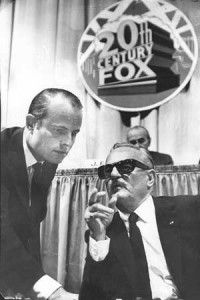Tuesday

"The Attack of the Small Screen." Part Six of Moguls and Movie Stars on TCM. The re-run played last night at 7:00, then I watched Part Seven at 8:00. The 7-episode series is now over. It was highly enjoyable, with a slight political slant (they mentioned that the first head of the Motion Picture Production Code was a "devout Catholic," but no mention that most of the moguls were Jewish . . . instead just referring to the fact that they were mostly from Eastern Europe). Last night, I had to watch episodes back-to-back since I missed last week.
Unfortunately, the two-hour screen-fest killed my blogging time, so I've contented myself with a handful of interesting notes that I typed up while watching. Hopefully, y'all will find them interesting.
The moguls thought television was a gimmick, not a real threat. "People go out to eat," said one mogul, "even though they have kitchens."
In 1951, Louis B. Mayer was the highest paid executive in America. But within a few years, he would be out of a job. It put Louis in a free-fall. His grandson said it was one of the saddest things he'd ever seen. Louis died in 1957.
In order to fight off TV, movies made the screens bigger, added more color and stereo, and even brought out 3D. 3D last only a few years, and everyone, including moviegoers, were happy it was gone. Nobody thought it'd ever make a comeback.
The movies originated in New York, but the industry fled to Hollywood before 1920 in order to escape thugs that were sent by the Edison Trust. In the 1950s, though, entertainment returned to New York: through television. Broadway stars like Andy Griffith made an easy jump to the small screen. The young industry then sprung up in the Big Apple.
Billy Wilder was a self-described gigolo, but acquaintances say he may have been the most-erudite writer in the history of Hollywood.
Many of the founding movie moguls passed away in the 1950s. At the same time, their power was sapped by mega-stars and entertainment corporations like MCA.
Lew Wasserman was the head of MCA. He was a big-time liberal and tied Hollywood and DC together more than ever. I wonder to what extent a study of Wasserman's life would give insight to the ties between big business, big government, big entertainment, and big education, even though Wasserman was dealt a severe blow by the feds in the early 1960s.
What Ever Happened to Baby Jane looks like a freaky movie.
Today's outrageous wages for Hollywood stars began with Elizabeth Taylor's Cleopatra. She received $1 million. It started a spirit of one-up-man-ship among the stars, each trying to out-do one another.
Cleopatra was such a debacle, it almost destroyed 20th Century Fox. It actually shut down for four months, with only one janitor in employ.
